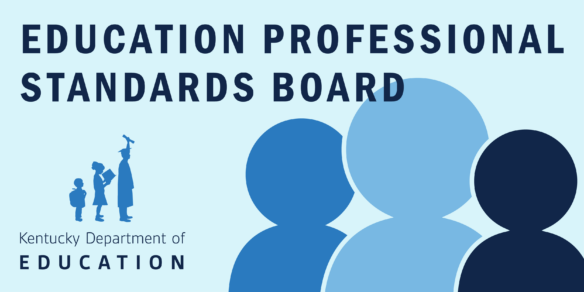
Members of the Kentucky Education Professional Standards Board (EPSB) approved a list of legislative priorities and goals for the upcoming year during their meeting on Dec. 17.
Cassie Trueblood, policy advisor in the Kentucky Department of Education (KDE) Office of Educator Licensure and Effectiveness and lead counsel for EPSB, said the goals mirror priorities the Kentucky Board of Education approved in October. Additional legislative goals include funding for teacher mentoring and induction programs, financial incentives for new and existing educators, and statutory cleanup.
She said the goals for EPSB also prioritize updating the EPSB website to improve communication with education partners, stakeholders and the public.
Following the EPSB’s approval, Trueblood said KDE will now work on a strategic plan with action items related to their priorities for consideration during the EPSB’s meeting in February.
Early Literacy and Numeracy Assessments
EPSB members voted to approve recommendations by the Early Literacy Cohort regarding Elementary and Early Childhood Education Praxis requirements.
Senate Bill 9 (2022), also known as the Read to Succeed Act, amended KRS 164.306 and requires EPSB to develop and maintain a list of approved teacher preparation tests for the effective evaluation of a potential educator’s reading instruction knowledge and skills. All new teachers seeking certification must pass an approved teacher preparation test that includes evaluation of reading instruction knowledge and skills.
The Early Literacy Cohort, made up of college and university education program representatives, makes recommendations on the assessment of reading instruction knowledge and skill.
Winn Wheeler, assistant professor of early literacy at Bellarmine University, is a member of the Early Literacy Cohort. She said the cohort recommended moving to the Elementary Education: Multiple Subjects test (Praxis 7001) and giving students a year with no cut scores to help those with different curricula within their literacy coursework. The cohort also recommended moving to a multi-state standard setting cut score for the 2025-2026 school year.
Melissa Diebel, an education academic program manager with KDE, said this recommendation changes what the cohort originally recommended during the 2023-2024 school year, which was to add the Teaching Reading: Elementary test (Praxis 5205) to the current Praxis Elementary Education: Multiple Subjects test (Praxis 5001).
“However, the additional test was found to be a challenge due to cost and time involved in taking the assessment,” she said.
EPSB also approved recommendations from the Numeracy Cohort on rubrics for the evaluation of mathematics educators.
House Bill 162, also known as the Kentucky Numeracy Counts Act, created KRS 164.3061 and requires EPSB to develop and maintain a list of approved teacher preparation assessments for effective mathematics instruction. The legislation also tasks EPSB with developing an evaluation rubric for observing teacher candidates with a focus on mathematics content and knowledge.
KDE created a Numeracy Cohort to make recommendations in a similar fashion to the Early Literacy Cohort.
Jennifer Fraley, KDE’s director of mathematics education, said the cohort recommended four rubrics to be used in a pilot program with educator preparation programs: the Kentucky Mathematics Innovation Tool, the Kentucky Instructional Practice Guide, the New Teacher Project Math Observation Protocol and the Mathematics Classroom Observational Protocol for Practices.
Fraley said the pilot program will begin in the spring of 2025. Data and observations collected from the pilot program will be given to the EPSB for further discussion following the spring semester.




Leave A Comment